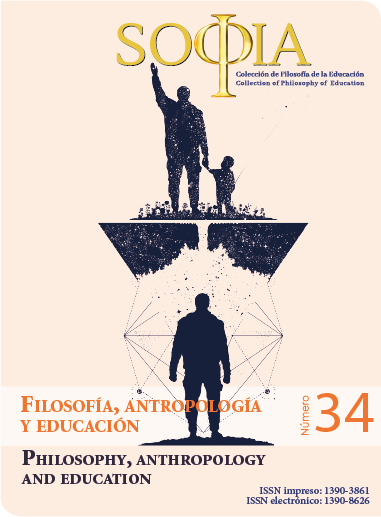Sociological contributions of Durkheim and Bernstein to sociocultural diversity in school
Main Article Content
Abstract
Article Details

This work is licensed under a Creative Commons Attribution-NonCommercial-ShareAlike 4.0 International License.
Authorship: The list of authors signing must include only those people who have contributed intellectually to the development of the work. Collaboration in the collection of data is not, by itself, a sufficient criterion of authorship. "Sophia" declines any responsibility for possible conflicts arising from the authorship of the works that are published.
Copyright: The Salesian Polytechnic University preserves the copyrights of the published articles, and favors and allows their reuse under the Creative Commons Attribution-NonCommercial-ShareAlike 3.0 Ecuador license. They may be copied, used, disseminated, transmitted and publicly displayed, provided that: i) the authorship and the original source of their publication (journal, editorial and work URL) are cited; (Ii) are not used for commercial purposes; Iii) mention the existence and specifications of this license.
References
Adorno, T. (1998). Educación para la emancipación. Morata.
Ainscow, M. (2020). Promoting inclusion and equity in education: lessons from international experiences. Nordic Journal of Studies in Educational Policy, 6(1), 7-16. https://doi.org/10.1080/20020317.2020.1729587
Ainscow, M., Dyson, A., Goldrick, S., & West, M. (2012). Developing equitable education systems. Routledge.
Armijo-Cabrera, M. (2018). Deconstructing the Notion of Inclusion: An Analysis of Studies, Policies and Practices in Education. Revista Electrónica Educare, 22(3). https://doi.org/10.15359/ree.22-3.8
Ball, S. y Maroy, C. (2009). School’s Logic of Action as Mediation and Compromise between Internal Dynamics and External Constraints and Pressures. Compare: A Journal of Comparative and International Education, 39(1), 99-112.
Baudelot, Ch. & Establet, R. (1976). La Escuela Capitalista en Francia. Siglo XXI
Bernstein, B. (1989). Clases, Códigos y Control I Akal Universitaria
Bernstein, B. (1988). Clases, Códigos y Control II Akal Universitaria
Bernstein, B. (1988b). Poder, Educación y Conciencia. sociología de la transmisión cultural. CIDE
Blanco, R. (2006). La Equidad y la Inclusión Social: Uno de los Desafíos de la Educación y la Escuela Hoy. REICE. Revista Iberoamericana sobre Calidad, Eficacia y Cambio en Educación, 4, 1-15.
Bonal, X. (2000). Necrológica: Basil Bernstein. Papers 62 pp. 185-186
Bonal, X. (1998). Sociología de la Educación. Una Aproximación Crítica a las Corrientes Contemporáneas. Paidós
Bourdieu, P. & Passeron, C. (1977). La Reproducción. Elementos para una Teoría del Sistema de Enseñanza. Editorial Laia
Bourdieu, P. & Passeron, C. (2008) Los Herederos. Los estudiantes y la cultura, Siglo XXI.
Bowles, S. y Gintis, H. (1976). The capitalist school in America: educational reform and the contradictions of economic life. Basic Books.
Calero, J. & Bonal, X. (1999). Política educativa y gasto público en educación. Aspectos teóricos y una aplicación al caso español. Barcelona: Pomares-Corredor.
Collins, R. (1989). La Sociedad Credencialista. Akal
Díaz, M. (1985). Introducción al Estudio de Bernstein. Universidad Pedagógica Nacional Nº15
Díaz, M. (2019). Discurso y Pedagogía. Poder, Control y Educación en Basil Bernstein. Editorial UOC
Durkheim, E. (1982). La División del Trabajo Social. Akal Universitaria
Durkheim, E. (1957). The Elementary Forms of the Religious Life. Allen & Unwin Ltd.
Gane, M. (1992). The Radical Sociology of Durkheim and Mauss. Routledge
Habermas, Jürgen (1999). La Inclusión del Otro. Estudios en Teoría Política. Paidós
Habermas, Jürgen (2002). Teoría y Praxis. Tecnos
Kant, Emmanuel (1985). Sobre la Paz Perpetua. Tecnos
Kant, Emmanuel (1991). Antología. Edición de Roberto Rodríguez Aramayo. Ediciones Península
Lukes, S. (1973). Emile Durkheim. His Life and Work. A Historical and Critical Study. Penguin Press
Maroy, C. (2004). “Changes in regulation modes and social production of inequalities in education systems: a European Comparison” Reguleducnetwork European Commission. Final Report.
Smith, Adam (2009). Una Investigación sobre el origen y las causas de la riqueza de las naciones. Tecnos
Solomon, J., Bocchetti, A. & Maçaira, J. (2021). Entrevista con Basil Bernstein. Currículo sem fronteiras, Vol.21 (3), p.1825-1843
UNESCO. (2005). El imperativo de la calidad. Informe de seguimiento de la Educación para Todos en el Mundo. UNESCO.
Van Zanten, A. (2008). Competitive arenas and schools' logics of action: a European comparison, Compare: A Journal of Comparative and International Education, 39:1, 85-98, DOI: 10.1080/03057920802447867
Willis, P. (2017). Aprendiendo a trabajar: Cómo los chicos de la clase obrera consiguen trabajos de clase obrera. Akal
Zancajo, A. (2017). Las Escuelas ante el Mercado. Análisis de la Respuesta de la Oferta Escolar en un Entorno de Competencia: El Caso de Chile. Tesis Doctoral. Universidad Autónoma de Barcelona

